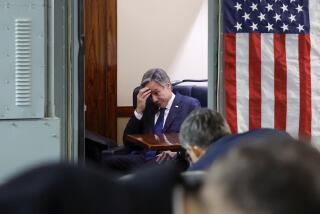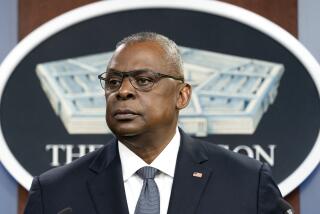U.S. Rejects Calls for Efforts to Oust Hussein
- Share via
WASHINGTON — Laying out the U.S. blueprint for containing Iraq, National Security Advisor Samuel R. “Sandy” Berger on Wednesday rejected as impractical calls for the Clinton administration to actively work to remove Saddam Hussein from power.
Instead, Berger said, the U.S. goal will continue to be reining in the Iraqi dictator’s ability to develop weapons of mass destruction or threaten his neighbors while promoting efforts for a new government in Baghdad “over the long term.”
Berger, in a speech exactly a week after the start of a four-day bombardment of Iraq, noted that administration critics increasingly “say we should just get rid of [Hussein], now, no matter what the cost.” But he added, “That may be emotionally satisfying, but it is not a strategy.”
The only sure way to oust Hussein “would be to commit hundreds of thousands of American troops to fight on the ground inside Iraq,” Berger said. “I do not believe that the cost of such a campaign would be sustainable, at home or abroad. And the reward of success would be an American military occupation of Iraq that could last for years.”
Berger’s comments reiterated existing U.S. policy, and he stressed that 8-year-old economic sanctions against Iraq--imposed after Baghdad invaded Kuwait in 1990--can be lifted only if Hussein cooperates with U.N. weapons inspectors. But his speech, which came amid growing frustration among critics over the administration’s Iraq policy, served as a de facto rebuff to those demanding new measures or a new direction.
One of the Senate’s most respected voices on foreign affairs, Richard G. Lugar (R-Ind.), argued in a Washington Post commentary Sunday that President Clinton should make Hussein’s ouster an immediate and primary goal.
“Our policy should be to do whatever is necessary to displace Saddam,” Lugar wrote. “He may be removed by his own suppressed people, his own surviving family, his own military or our military, but that outcome should be at the heart of our policy until it is accomplished.”
Although only a handful of other members of Congress are believed to support such a strategy, Capitol Hill sources talk of a broad and growing unease about what lawmakers see as a lack of credible alternatives to the administration’s strategy.
“There’s a frustration that’s building up,” said one congressional staff member who declined to be identified.
Berger, in his speech, said the U.S. will engage only in a “step-by-step” strengthening of Iraqi political groups opposed to Hussein.
“If we are serious, we must do this carefully, not noisily,” he said.
Berger said representatives of Iraqi opposition groups will be invited to meet with administration officials in Washington next month. He added that the administration will follow through with selecting the groups that will receive $97 million in military aid approved by Congress.
The U.N. sanctions have been a sore point among some Western European nations and Russia, and that concern also is beginning to be voiced in Washington.
In the House of Representatives, for example, a group of 43 members headed by Rep. John Conyers Jr. (D-Mich.) signed a letter to Clinton in early October backing military sanctions against Iraq but urging a review of the economic sanctions, declaring them “a complete failure.”
“We hold no illusions about Iraq’s overall record of compliance with weapons inspections,” the lawmakers wrote. “It is clear, however, that continued economic sanctions allow Saddam Hussein to exploit the suffering of his people to his political advantage.”
On Wednesday, Berger called on Hussein to permit arms inspectors back into Iraq and allow them to complete their task of searching for weapons of mass destruction and, eventually, declaring the nation free of such devices. Under the terms of a U.N. Security Council resolution, such a declaration is required before the sanctions can be lifted as a first step toward re-integrating Iraq into the international community.
Berger said U.N. chief weapons inspector Richard Butler had proposed a plan to assure compliance that would take three to six months.
“If Saddam had the will to comply, he certainly has the way,” Berger said.
But Hussein’s regime was defiant Wednesday, ordering the U.N. observer force that monitors the Iraq-Kuwait border to cancel a scheduled flight to Iraq. U.N. officials said they had no details on who was aboard the flight, which regularly carries observers from Jordan to an air base outside Baghdad. The observers have been keeping tabs on the cease-fire that ended the 1991 Persian Gulf War and monitoring the demilitarized zone between Iraq and Kuwait.
More to Read
Sign up for Essential California
The most important California stories and recommendations in your inbox every morning.
You may occasionally receive promotional content from the Los Angeles Times.










